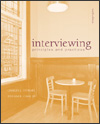 |  Interviewing: Principles and Practices, 10/e Charles J. Stewart,
Purdue University--West Lafayette
William B. Cash,
National Louis University--Evanston
The Health Care Interview
Chapter Summary| The health care interview is difficult and complex. Situations vary from routine to life-threatening. The relationship between health care provider and consumer is affected by tradition, myths, professional and societal expectations, and the differing perceptions of both parties. Both providers and patients often feel threatened and may take defensive measures ranging from reticence to hostility to escape. The provider may act as information-giver, information-getter, and counselor within a brief interview. Each role is fraught with difficulties, but the difficulties can be recognized and overcome.
The provider (from receptionist to physician) and the consumer must realize that good communication is essential for effective health care and that communication skills do not come naturally or merely with experience. Skills require thorough training and practice. The health care interview must be a collaborative effort between two parties with much to gain and much to lose. |
|



 2003 McGraw-Hill Higher Education
2003 McGraw-Hill Higher Education